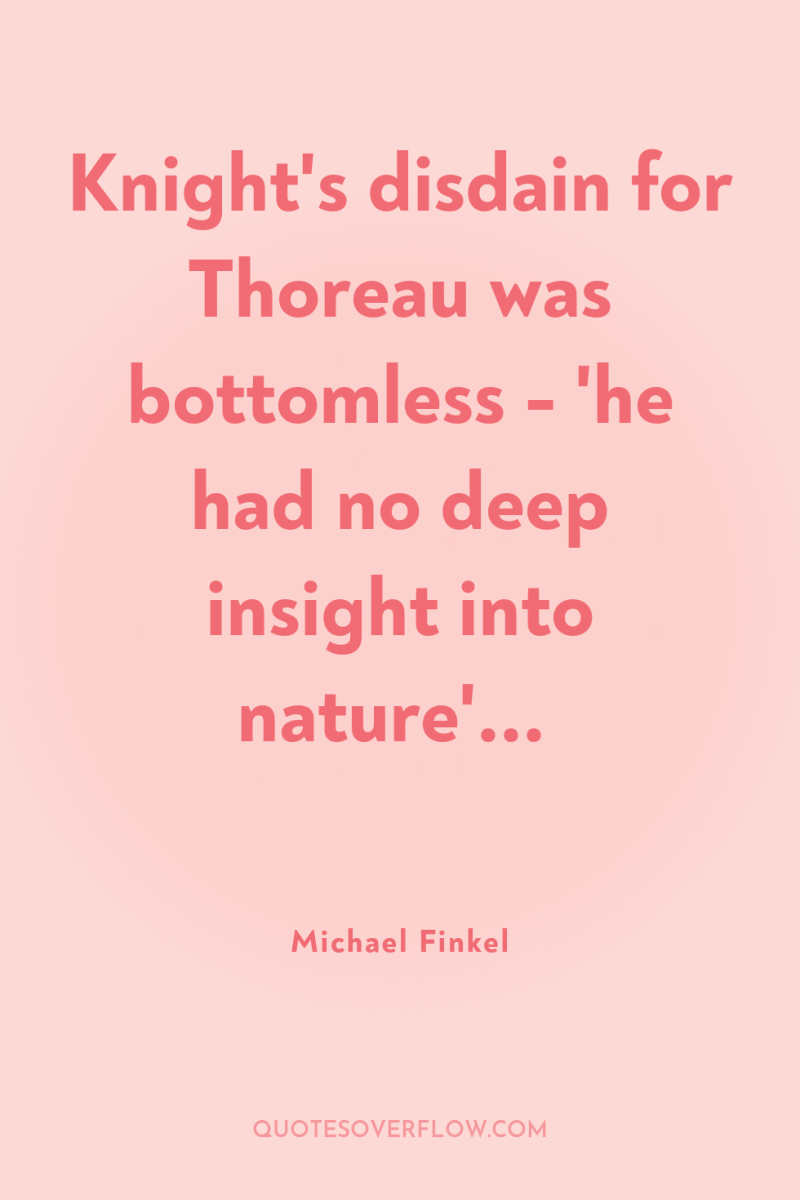1
In any weather, at any hour of the day or night, I have been anxious to improve the nick of time, and notch it on my stick too; to stand on the meeting of two eternities, the past and the future, which is precisely the present moment; to toe that line. You will pardon some obscurities, for there are more secrets in my trade than in most men's, and yet not voluntarily kept, but inseparable from its very nature.Henry David Thoreau

2
The outside is the only place we can truly be inside the world.Daniel J. Rice

3
Knight's disdain for Thoreau was bottomless - 'he had no deep insight into nature'...Michael Finkel
4
This afternoon, being on Fair Haven Hill, I heard the sound of a saw, and soon after from the Cliff saw two men sawing down a noble pine beneath, about forty rods off. I resolved to watch it till it fell, the last of a dozen or more which were left when the forest was cut and for fifteen years have waved in solitary majesty over the sprout-land. I saw them like beavers or insects gnawing at the trunk of this noble tree, the diminutive manikins with their cross-cut saw which could scarcely span it. It towered up a hundred feet as I afterward found by measurement, one of the tallest probably in the township and straight as an arrow, but slanting a little toward the hillside, its top seen against the frozen river and the hills of Conantum. I watch closely to see when it begins to move. Now the sawers stop, and with an axe open it a little on the side toward which it leans, that it may break the faster. And now their saw goes again. Now surely it is going; it is inclined one quarter of the quadrant, and, breathless, I expect its crashing fall. But no, I was mistaken; it has not moved an inch; it stands at the same angle as at first. It is fifteen minutes yet to its fall. Still its branches wave in the wind, as it were destined to stand for a century, and the wind soughs through its needles as of yore; it is still a forest tree, the most majestic tree that waves over Musketaquid. The silvery sheen of the sunlight is reflected from its needles; it still affords an inaccessible crotch for the squirrel’s nest; not a lichen has forsaken its mast-like stem, its raking mast, –the hill is the hulk. Now, now’s the moment! The manikins at its base are fleeing from their crime. They have dropped the guilty saw and axe. How slowly and majestic it starts! as it were only swayed by a summer breeze, and would return without a sigh to its location in the air. And now it fans the hillside with its fall, and it lies down to its bed in the valley, from which it is never to rise, as softly as a feather, folding its green mantle about it like a warrior, as if, tired of standing, it embraced the earth with silent joy, returning its elements to the dust again. But hark! there you only saw, but did not hear. There now comes up a deafening crash to these rocks , advertising you that even trees do not die without a groan. It rushes to embrace the earth, and mingle its elements with the dust. And now all is still once more and forever, both to eye and ear. I went down and measured it. It was about four feet in diameter where it was sawed, about one hundred feet long. Before I had reached it the axemen had already divested it of its branches. Its gracefully spreading top was a perfect wreck on the hillside as if it had been made of glass, and the tender cones of one year’s growth upon its summit appealed in vain and too late to the mercy of the chopper. Already he has measured it with his axe, and marked off the mill-logs it will make. And the space it occupied in upper air is vacant for the next two centuries. It is lumber. He has laid waste the air. When the fish hawk in the spring revisits the banks of the Musketaquid, he will circle in vain to find his accustomed perch, and the hen-hawk will mourn for the pines lofty enough to protect her brood. A plant which it has taken two centuries to perfect, rising by slow stages into the heavens, has this afternoon ceased to exist. Its sapling top had expanded to this January thaw as the forerunner of summers to come. Why does not the village bell sound a knell? I hear no knell tolled. I see no procession of mourners in the streets, or the woodland aisles. The squirrel has leaped to another tree; the hawk has circled further off, and has now settled upon a new eyrie, but the woodman is preparing [to] lay his axe at the root of that also. .Henry David Thoreau
5
The endless ocean was his sole companion , and on some deeply sentimental level, it seemed sufficient. Almost apt. He aligned himself with Thoreau and Tolstoy, he felt like their peers. The kinship with nature devoted humans to a mythical state, a heightened persona beyond the reach of mere mortals. At least that was what he told himself on the lonely nights when insomnia played on his fears and the howling wind pierced through his soul.Adelheid Manefeldt
6
There is no remedy for love but to love more."- Henry David ThoreauHenry David Thoreau
7
The trees show definitions of themselves subtly like the face of a man.Daniel J. Rice
8
Books had rescued me when i most needed saving.. Books were smarter than me and words inspired me.. to try something new, charge forward without a clear understanding of what would happen next, because "given something like death, what does it matter if one looks foolish now and then, or tries too hard, or cares too deeply?" In the end, Thoreau, Whitman, Hafiz, and a dozen other writers put me up to the task of seeing if I dared to "live a life worth living.Dee Williams
9
Thoreau went to the woods. I went to the mats.Chris Matakas
10
It is life near the bone where it is sweetest.Henry David Thoreau
11
Ultimately, I found my instincts mirrored in a line from Thoreau: 'My needle...always settles between west and south-southwest. The future lies that way to me, and the earth seems more exhausted and richer on that side.Phillip Connors
12
Society is commonly too cheap. We meet at very short intervals, not having had time to acquire any new value for each other. We meet at meals three times a day, and give each other a new taste of that musty old cheese that we are. We have had to agree on a certain set of rules, called etiquette and politeness, to make this frequent meeting tolerable and that we need not come to open war. We meet at the post office, and at the sociable, and at the fireside every night; we live thick and are in each other's way, and stumble over one another, and I think that we thus lose some respect for one another.Henry David Thoreau
13
Kessler depicts his developing intimacy with a handful of dairy goats and offers an enviable glimpse of the pastoral good life. Yet he also cautions, "Wherever the notion of paradise exists, so does the idea that it was lost. Paradise is always in the past." The title Goat Song is a literal rendering of the Greek word traghoudhia, tragedy. Reading it, I was reminded of Leo Marx's analysis of Thoreau's Walden. In The Machine in the Garden, Marx names Thoreau a tragic, if complex pastoralist. After failing to make an agrarian living raising beans for commercial trade (although his intent was always more allegorical than pecuniary), Thoreau ends Walden by replacing the pastoral idea where it originated: in literature. Paradise, Marx concludes, is not ultimately to be found at Walden Pond; it is to be found in the pages of Walden. .Heather Paxson
14
Most of the luxuries, and many of the so called comforts of life, are not only indispensable, but positive hinderances to the elevation of mankind. With respect to luxuries and comforts, the wisest have ever lived a more simple and meagre life than the poor.Henry David Thoreau
15
Give me a bottle of hard cider, a bowl of Peterson Irish Oak in my Neerup pipe, and please, above all, give my Henry David Thoreau’s Wild Apples. Do that and you will see a man contented.Nicholas Trandahl
16
Read the best books first, otherwise you’ll find you do not have time. - Henry David ThoreauLeo Tolstoy